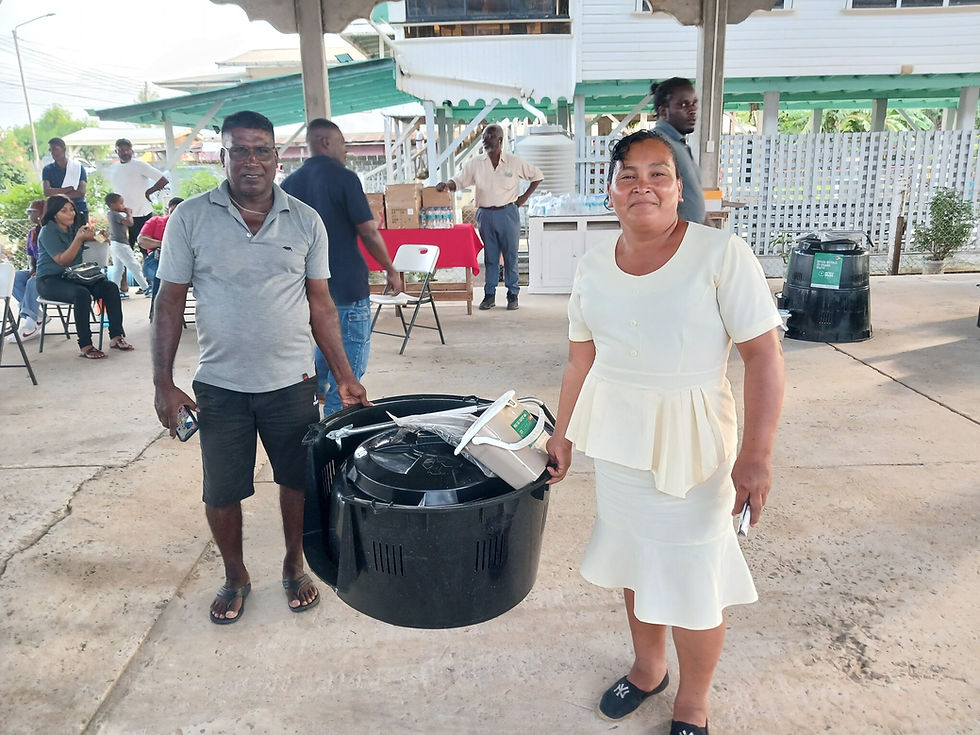Scaling Climate Action in SIDS: Charting Recycle Organics’ Impact Across the Caribbean
- Recycle Organics

- Aug 7, 2025
- 7 min read
(Original story on recycleorganics.org)

Key Takeaways:
Local consultants are the heart of Recycle Organics’ work in SIDS—leading with deep knowledge, care and community trust.
From kitchens to classrooms, composting is emerging as a sustainable response to waste management, shaped by community action and grounded in everyday life.
Beyond infrastructure, Recycle Organics is helping to craft policies and strategies that embed organic waste solutions into long-term sustainability plans.
As global temperatures rise, Small Island Developing States (SIDS) bear the brunt of the climate crisis. These island nations contribute barely 1% to global emissions, yet they are on the frontlines of worsening climate impacts—from sea-level rise to deadly heatwaves. Addressing these challenges requires not only urgent climate action worldwide but also targeted local projects and solutions. Understanding what truly works in each country begins with listening to—and working alongside—the people rooted in its soil.
One of the most effective climate strategies is reducing methane emissions from organic waste. Methane, a short-lived but potent greenhouse gas, is over 80 times more powerful than carbon dioxide over a 20-year period. Reducing methane emissions—especially the 20% that come from the waste sector —is one of the quickest strategies to curb short-term global warming.
Led by the Center for Clean Air Policy (CCAP) and ImplementaSur, the Recycle Organics Program helps countries turn organic waste into climate solutions. Overall, the Program is positioned to mitigate up to +31 million tons of CO2e over the next 20 years and divert more than 700,000 tons of organic waste from landfills annually.
Working together with governments, institutions, communities and local actors to advance policies, projects and public engagement, the Program helps countries achieve the Global Methane Pledge, which calls for a 30% reduction in global methane emissions by 2030.
Recycle Organics has a strong focus on working with developing countries and SIDS, helping to create enabling conditions for sustainable organic waste treatment projects, supporting local innovation and replicating successful models across regions. With support from Environment and Climate Change Canada, throughout 2024, the program launched home composting and organic waste initiatives in Guyana, Belize, Saint Lucia and Grenada, strengthening its impact in the Caribbean. At the heart of this success are the skilled local consultants we collaborate with—each rooted in their country’s context. Here’s what the progress looks like from their perspective.
Guyana: Advancing Composting Practices in Schools and Farms
In Guyana, a home composting initiative is gaining momentum through a partnership with the Ministry of Local Government and Regional Development and the National Agricultural Research and Extension Institute (NAREI). A total of 40 compost bins have already been delivered to schools, and growing interest from the agricultural sector has also led to the distribution of an additional 89 bins to farmers.
Monitoring visits began in April, with six NAREI staff members trained to follow up with schools, farmers and municipalities, collecting data and offering technical support. This monitoring process will be essential to understanding the program’s impact and informing future scale-up.
“This is a most welcomed and exciting initiative in that it simplifies and modernizes an activity that has been practiced historically, but only in small or select sectors of the community,” said Samuel Wright, Local Consultant for the Recycle Organics program in Guyana. “The application and induction of this activity to schools and farms makes it easier for others to learn and to use composting. The widespread adoption of household composting also addresses a continuing issue in Guyana: waste management. Organic waste makes up more than 50% of the waste generated here.”
The University of Guyana has also been part of the work. The Program provided a biodigester to advance research on treating organic waste and using biogas and digestate as a resource. Additionally, the RO team provided comments and recommendations to the draft of the solid waste management Bill that is being developed by the Ministry. When approved, this would become the first national policy Act for the sector.

Belize: Turning Waste into Value Through Education and Collaboration
In Belize, the Home Composting Program, launched in partnership with the Belize Solid Waste Management Authority, is developing a strong reputation for its educational outreach and collaboration with municipalities. Community involvement has been key to shaping a program that is both practical and well received. The initiative is also exploring the local production of composting bins using recycled plastics, which could improve accessibility and support long-term sustainability.
Monitoring activities began in October 2024, covering four communities. Preliminary results show that 15 tonnes of organic waste have been composted to date. Notably, 93% of participants said they would recommend the program to others—highlighting its strong reception and positive impact on the community.
To tackle food insecurity and engage the community’s youth, Recycle Organics distributed composting bins to 13 schools—most of which have active garden clubs. An additional six schools are already confirmed to join in the next academic year.
“The School Composting Program has been more than just learning to compost,” said Local Consultant for Belize, Tara Hoisington. “It’s about teaching students that their waste has value, and they have a responsibility in protecting the environment. They’re learning that small actions, like turning food waste into compost, can make a big difference. Watching them take ownership of that process has been very rewarding.”

In parallel, the Program launched the Organic Waste Network and Educational Program, helping to build capacity among municipal officials and spark a national conversation around organic waste management—often overshadowed by plastics and metals. Through targeted webinars and peer exchanges, the Network has highlighted local initiatives while connecting them to global best practices. In addition, close collaboration with local governments has led to the development of Organic Waste Management Plans, which will guide municipalities toward context-specific solutions and future investments.
“By starting the conversation, building capacity and raising awareness, the Program is taking a meaningful step toward advancing waste management in Belize,” said Alejandra Pedraza Luengas, Policy Local Consultant for Belize. “At the household level, the home composting initiative is fostering a multigenerational shift in how waste is managed.”
Saint Lucia: Inspiring Communities Through Composting
In Saint Lucia, the Home Composting Program was developed in close collaboration with the Solid Waste Management Authority (SLSWMA), ensuring strong participant engagement and a sense of local ownership from the outset. To date, a total of 197 composting bins have been distributed across the country, laying the foundation for a more sustainable approach to organic waste management.
Six community monitors support the program, plus one lead monitor, who began their follow-up visits at the beginning of this year. Initial findings show promising levels of participation and motivation among households. In parallel, efforts are underway to identify funding opportunities to expand the program and include additional communities.
“It’s been a true honor to witness the transformation taking place through Saint Lucia’s Home Composting Program,” said Rodesha Reid, Local Consultant in Saint Lucia. “What began as a sustainability initiative has evolved into something far more meaningful: a shared journey of growth, learning and community connection. Seeing participants turn everyday kitchen scraps into rich, fertile compost is inspiring on its own. But even more powerful is the way neighbors have come together, sharing insights and encouragement along the way. It’s in these moments of exchange that the heart of the program truly shines.”
The Program is also supporting the Solid Waste Management Authority in drafting a national regulation to require source separation of organic waste—laying out a clear roadmap for key actors to reduce landfilling and scale up composting. To strengthen outreach, a communications strategy is being developed in parallel. At the same time, the Program is collaborating with the Saint Lucia Hospitality and Tourism Association (SLHTA) to support the hospitality sector through an educational network that delivers training webinars and in-person guidance for launching on-site composting.

Grenada: A Collaborative Push Toward Sustainable Waste Solutions
In Grenada, Recycle Organics is supporting a broad and growing network of composting initiatives in close collaboration with the Grenada Solid Waste Management Authority (GSWMA). Thanks to this partnership, the program has successfully reached eight communities across the country.
The overwhelming community response has led to the program being oversubscribed, highlighting Grenada’s enthusiasm for sustainable waste practices. Monitoring activities are already underway, with trained staff visiting participating households to provide guidance and collect data.
The program continues to explore new opportunities for expansion, building on this momentum and community enthusiasm to deepen its impact nationwide.
“The Home Composting Program has been an inspiring success, with many new families expressing their interest to join,” said our Local Consultant in Grenada, Hayden Redhead. “Participants are excited about the prospect of using compost created by their families in their own gardens, and the opportunity to grow healthy food without the use of harmful chemical fertilizers. The program is well set to start scaling up and mainstreaming organic waste separation at source, composting and rebuilding our soil.”
Beyond community outreach, Recycle Organics is supporting systemic change through the Recycling Organics Composting at Schools (ROCS) Program, engaging over 900 students in composting practices with the support of the Ministry of Agriculture’s 4H movement. The Program is also helping the Grenada Solid Waste Management Authority develop an implementation plan for the national strategy and conduct a waste characterization study. Together, these efforts will generate key data and a clear roadmap for advancing sustainable organic waste practices nationwide.

Next steps
None of this would be possible without the on-the-ground leadership and dedication of our local consultants: Samuel (Guyana), Tara & Alejandra (Belize), Rodesha (Saint Lucia) and Hayden (Grenada). Their knowledge, coordination and strong commitment to this work are vital to each country’s progress and to ensuring that local contexts remain at the heart of climate solutions.
As the Recycle Organics program continues to support methane mitigation through organic waste management, our work in SIDS serves as a reminder that local actions can have a global impact. With each compost bin distributed, each biodigester installed and each student or farmer engaged, we move closer to a more resilient, climate-safe future.
Stay Tuned!
From September 23–25, the Recycle Organics Program will host Recycle Organics: Deepening Impact, Expanding Action in SIDS in Florianopolis, Brazil. With support from Environment and Climate Change Canada (ECCC), the event will celebrate achievements under the SIDS program and bring together its local island consultants and country representatives to showcase progress and plan the next steps for continued methane mitigation opportunities.
Stakeholders will also explore how organic waste initiatives can support countries in meeting their Nationally Determined Contributions (NDCs), while fostering cross-country collaboration and knowledge exchange on sustainable waste management and climate action.
Stay Connected!
There are numerous ways to stay connected with CCAP. Follow us on X (@CCAPolicy) and on Facebook & LinkedIn.
CCAP’s mission is to support every step of climate action, from ambition to implementation. A recognized world leader in climate policy and action, CCAP creates innovative, replicable climate solutions, strengthens capacities, and promotes best practices across the local, national, and international levels to accelerate the transition to a net-zero, climate resilient future. CCAP was founded in 1985 and is based in Washington, DC.

































It's impressive, fnf mods, —it's inspiring how local communities are turning food waste into climate action!
I really liked how this post focuses on small actions creating a big collective impact. It reminded me of how progress works in education too steady effort and smart preparation lead to real results. For nursing students, learning from the Best TEAS Exam Takers can be a huge help because they often share strategies on managing time, focusing on weak areas, and staying consistent, which feels a lot like how small islands are tackling climate challenges through focused, sustainable steps.
شيخ روحاني
رقم شيخ روحاني
الشيخ الروحاني
الشيخ الروحاني
شيخ روحاني سعودي
رقم شيخ روحاني
شيخ روحاني مضمون
Berlinintim
Berlin Intim
جلب الحبيب
https://www.eljnoub.com/
https://hurenberlin.com/
Experience the convenience of individualized company in top-notch Escorts in Dwarka. Each member of our carefully chosen roster is a sophisticated character who can turn an ordinary evening into a spectacular occasion. We prioritize privacy and customer happiness while offering a smooth reservation process. Your ideal companion is waiting to make everything great, whether it's for a lively party event or a romantic meal.
Take Care of Shadow Milk is much more than just cleaning and feeding your pet. Stop using dull pet simulators. In a hilarious blend of chaos and ingenuity, test, prod, and pull practical jokes without repercussions to push Shadow Milk Cookie to the limit.